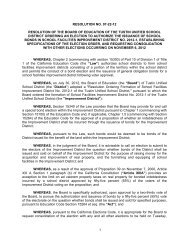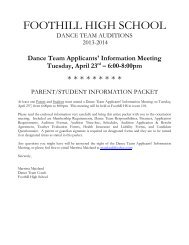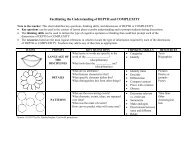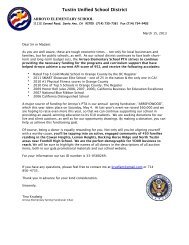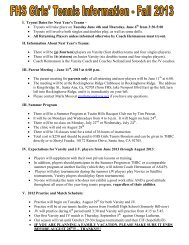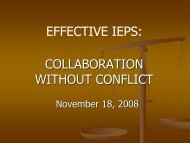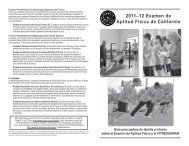College Planning - Tustin Unified School District
College Planning - Tustin Unified School District
College Planning - Tustin Unified School District
You also want an ePaper? Increase the reach of your titles
YUMPU automatically turns print PDFs into web optimized ePapers that Google loves.
navigating financial aid<br />
three ways to file, but one is best<br />
There are three ways to complete and file a<br />
FAFSA:<br />
··<br />
Online at FSA’s website—www.fafsa.gov<br />
··<br />
PDF FAFSA that you download, complete, and<br />
mail—go to www.federalstudentaid.ed.gov<br />
and click on “FAFSA Filing Options”<br />
··<br />
Paper FAFSA that you complete and mail—<br />
to get a paper FAFSA, call 1.800.4.FED.AID<br />
Online filing is much faster than filing a PDF<br />
or paper FAFSA if you electronically sign your<br />
application with your Federal Student Aid PIN.<br />
PINs are issued by FSA at www.pin.ed.gov.<br />
You, and at least one parent if you are a<br />
dependent student, will need to have a PIN to<br />
electronically sign the FAFSA.<br />
Filing the FAFSA online eliminates delays that<br />
can occur from mailing. Also, your application<br />
is edited for errors as you complete it to ensure<br />
your information is as accurate as possible.<br />
When FAFSA information is transmitted over<br />
the Internet, it is completely secure. FAFSA<br />
on the Web is easy to navigate and offers<br />
extensive online help. Applicants who have<br />
questions while filling out their FAFSA can click<br />
on the “Live Help” link to get online assistance<br />
from a knowledgeable customer service<br />
representative. In addition, application entries<br />
are thoroughly edited, reducing the number of<br />
errors made by students and their families.<br />
To make filing a FAFSA easier, the U.S.<br />
Department of Education offers the IRS Data<br />
Retrieval Tool to automatically transfer tax<br />
information from the IRS directly into the<br />
FAFSA. This tool is available only for those who<br />
have already completed their prior-year taxes<br />
at the time of FAFSA filing. Go to fafsa.gov to<br />
learn more about using the tool.<br />
special circumstances<br />
Special considerations that might affect your<br />
eligibility for aid include your dependency<br />
status and state of domicile.<br />
Independent vs. dependent status<br />
In determining financial need, one of the most<br />
important factors is whether you are classified<br />
as a dependent or independent student.<br />
Dependent students must include parental<br />
information on the FAFSA. Independent<br />
students should include information only<br />
on themselves and their spouse (when<br />
applicable). You are automatically classified as<br />
independent if you:<br />
··<br />
Will be 24 by December 31 of the award year<br />
··<br />
Are married on the date you file the FAFSA<br />
··<br />
Are a graduate or professional student<br />
··<br />
Are currently serving on active duty in the<br />
U.S. Armed Forces for purposes other than<br />
training<br />
··<br />
Are a veteran of the U.S. Armed Forces<br />
··<br />
Have children who will receive more than half<br />
their support from you between July 1, 2012<br />
and June 30, 2013<br />
··<br />
Have legal dependents (other than your<br />
children or spouse) who live with you and<br />
who receive more than half their support<br />
from you now and through June 30, 2012<br />
··<br />
When you were age 13 or older, both your<br />
parents were deceased and you were in<br />
foster care, a dependent, or ward of the court<br />
··<br />
As of the day you apply for aid, you are an<br />
emancipated minor as determined by a court<br />
in your state of legal residence<br />
··<br />
As of the day you apply for aid, you are in<br />
legal guardianship as determined by a court<br />
in your state of legal residence<br />
··<br />
At any time on or after July 1, 2008, your high<br />
school or school district homeless liaison<br />
determined that you were an unaccompanied<br />
youth who was homeless<br />
··<br />
At any time on or after July 1, 2008, the<br />
director of an emergency shelter program<br />
funded by the U.S. Department of Housing<br />
and Urban Development determined that<br />
you were an unaccompanied youth who was<br />
homeless<br />
··<br />
At any time on or after July 1, 2008, the<br />
director of a runaway or homeless youth<br />
basic center or transitional living program<br />
determined that you were an unaccompanied<br />
youth who was homeless or was selfsupporting<br />
and at risk of being homeless<br />
If none of these criteria apply to you, you are a<br />
dependent student.<br />
You may complete a Dependency Status<br />
Worksheet at www.fafsa.ed.gov/fotw1213/<br />
help/fftoc02k.htm to determine your<br />
dependency status before completing the<br />
FAFSA.<br />
In addition, the financial aid office at your<br />
college can determine that you should be<br />
considered independent if exceptional<br />
circumstances exist, but this occurs only in rare<br />
circumstances.<br />
Domicile<br />
On the FAFSA, domicile is referred to as your<br />
“State of Legal Residence.” A person’s domicile<br />
is their present, fixed home to which they<br />
return following temporary absences and at<br />
which they intend to stay indefinitely. To be<br />
eligible for in-state tuition benefits and most<br />
state-supported financial aid, you must have<br />
established domicile for at least one year prior<br />
to the first day of class. Minors are presumed<br />
to have the domicile of their parent or legal<br />
guardian.<br />
Domiciliary intent is determined using many<br />
factors. These could include paying state<br />
income tax as a resident, registering to vote<br />
in the state, owning property, permanent<br />
employment, sources of financial support, and<br />
economic ties with the state. The burden is on<br />
the applicant to provide sufficient information<br />
to establish domiciliary intent.<br />
Contact the domicile offices at your colleges for<br />
more information.<br />
In recent years, more than 98<br />
percent of FAFSA filers have<br />
applied online. It’s the fastest,<br />
the easiest, and simply the best<br />
way to file your FAFSA.<br />
15




